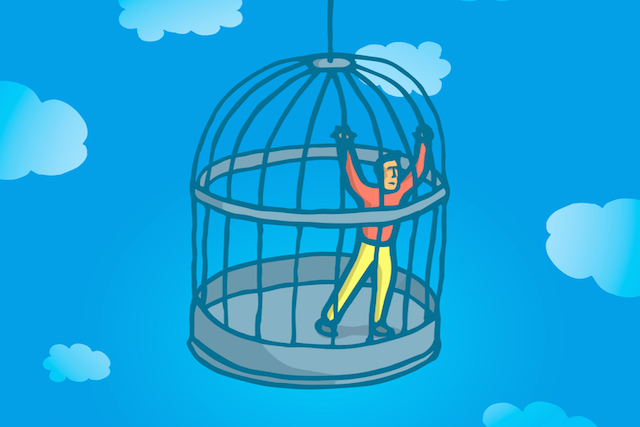
“Happiness is the absence of striving for happiness.” ~Chuang Tzu
Being an empty nester (the kids have grown up and left home), I noticed recently that I have fallen in love with little kids again.
After going through all the kid stages, and surviving them (most notably the teenage years), I took a long kid moratorium. Skiing, mountain biking, traveling, gardening, and reading—all filled to the brim with a commodity I had forgotten about: time just for me.
Now, unexpectedly, they’re back! Exhausting, enchanting, and a source of endless inspiration.
A few doors down to the west I have new neighbors—Parker, her brother, and her parents. Parker hollers my name when I drive by, waves vigorously trying to escape her car seat when her Mom drives by, and marches into my yard like she owns the place.
Full of “What’s that?” and “Why are you doing this?” questions. Needs to show me—no, demands to show me—whatever she has in her hand. Where she got it, what it does, and why it’s so important!
I’ll have to admit I was a little annoyed at this mini-interloper at first. But it didn’t take long before I was helplessly enchanted by whatever kid-spell she was weaving.
Parker is full out in the moment, fun, and crackling with excitement. What I quickly noticed, staring back at me, was how I was not (fun and in the moment).
Even though I subscribe to the practice of being present, it’s often more of an ideal than a practice. Every day there is the “to-do list.” What I need to get done, to keep everything moving, and (in my mind) to keep everything from falling apart.
I plan, scheme and, okay, I worry about whatever is coming up next. Finally, when it’s all over and done with, there is a big sigh of relief. Now I can go on to the next thing. Yet, once I’m on to the next thing the cycle starts all over again!
I’ve recognized that this daily trap can keep me from being truly happy and experiencing the fullness of being in the present moment. It’s what I call the “If, Then Trap.” It’s really a happiness trap.
The “If, Then Trap” goes something like this
If I can just get this finished, then I can relax…
If I were home more, then the kids would be happier….
If I had more money, then we would be happier…
If I exercised more, then I would be happier with myself…
If my son would only apply himself in school, then I’d feel okay…
What’s interesting about the “If, Then Trap” is that it is just a story. It’s a story about what we have decided things mean.
When I practice yoga, mediate, or just hike in the mountains, and quietly align with the present moment, what I notice is that there are no problems. Everything is perfectly okay! What’s extraordinary about this is that nothing has changed.
So why is there a deep sense of contentment during these life-stands-still moments when the external circumstances that keep us caught up in drama remain the same?
Here’s what I think: the mind chatter, the stories we tell ourselves, and what we decide everything means ignites emotions that are perfectly aligned with the story we have been telling ourselves.
It’s a viscous cycle: interpretation, and an emotional response that feeds right back into the story, the story grows and the resulting emotions make us unhappy.
Clearly, in the present moment, happiness just happens. Unhappiness is manufactured. Chuang Tzu was right: Happiness is the absence of striving for happiness.
As I finished writing this Parker appeared in my driveway.
“What are you doing???” she hollered.
“Writing about happiness,” I said.
“Why? Happiness is easy!” she yelled, peddling out of sight.
About Ray Dodd
Ray Dodd is a leading authority on belief-change, and author of the brand new book The Toltec Secret to Happiness. Through his Power of Belief ™ programs, Ray helps individuals and organizations shift limiting beliefs in order to affect lasting and positive change. His web site is: www.beliefworks.com.












 Though I run this site, it is not mine. It's ours. It's not about me. It's about us. Your stories and your wisdom are just as meaningful as mine.
Though I run this site, it is not mine. It's ours. It's not about me. It's about us. Your stories and your wisdom are just as meaningful as mine.
This is sooo true.. I realized after reading this that I, and a lot of people I know, fall guilty to the If, Then trap every day. I’m going to keep it in mind for the future, so thanks for sharing 🙂
It is easy for those who understand it. I always say, you can learn more from 2 years old child than from 32 years old grown up
I wanted to pin this quote on pinterest and looks like the quote may actually be from Chuang Tzu??
Awww I absolutely love the last part. “Happiness is easy” …. I have found myself where these three words have gone far from my vocabulary as I have gotten older. Life happens and we become hardened by life’s tribulations. This is a beautiful reminder of the happiness that’s easy to grasp if we just stop guarding ourselves and stop telling ourselves stories – the what and if scenario you speak of. Thank you for sharing this!
I am so guilty of this and it’s becoming a burden on my relationships. I’m unsure if it’s my programmer mind, but I think that rules are required in everything and there has to be some sort of “If Then” way to achieve things.
This is something I’ve been trying to overcome for a few months now and I’m just unsure how to escape this vicious cycle.
Jen – You write: “I’m just unsure how to escape this vicious cycle”. Awareness is the key to change. Once you are aware of the ” If, Then trap” you can make a choice. Without awareness it’s just a pattern. It takes a while, and there are certainly going to be mis-steps along the way, but I know you can do it! Blessings.
Great reminders. Ray!
It’s Madison Avenue that has us believing that happiness is when you acquire more “stuff”.
Happiness in the now requires that you unconditionally love yourself first. If you don’t feel good about yourself, no amount of money, fame and stuff will bring you happiness.
The Paradox of Intention says: “You must have goals but your happiness cannot be tied to those goals. You must be happy first before you reach your goals.
good stuff